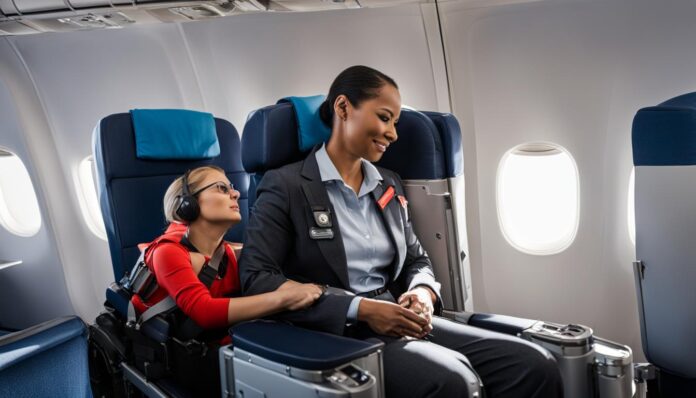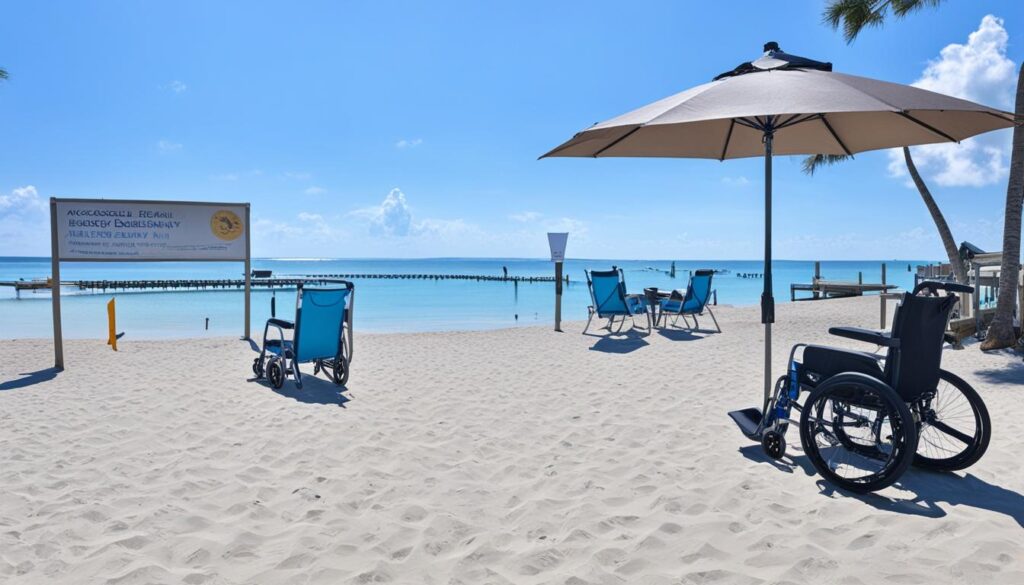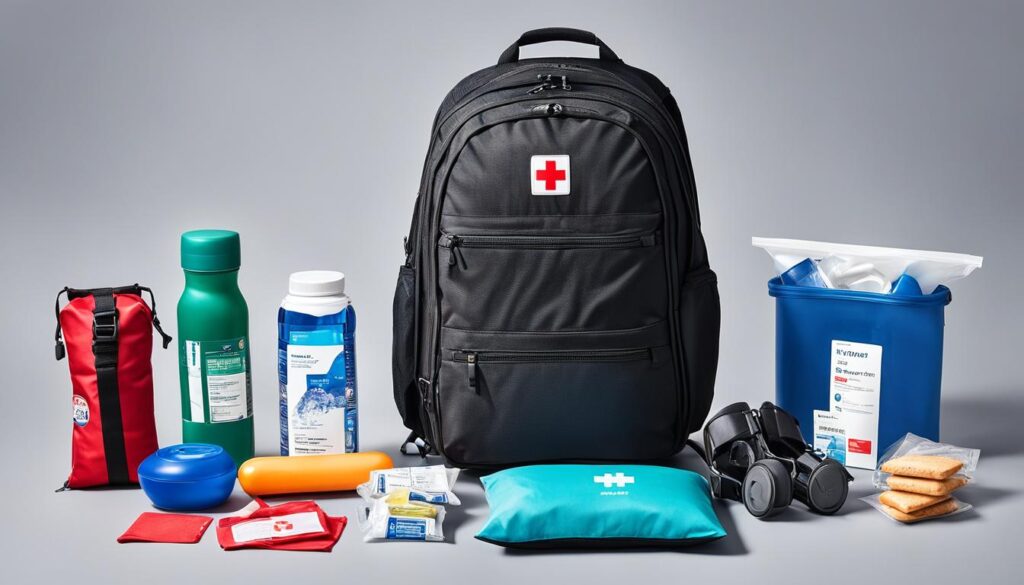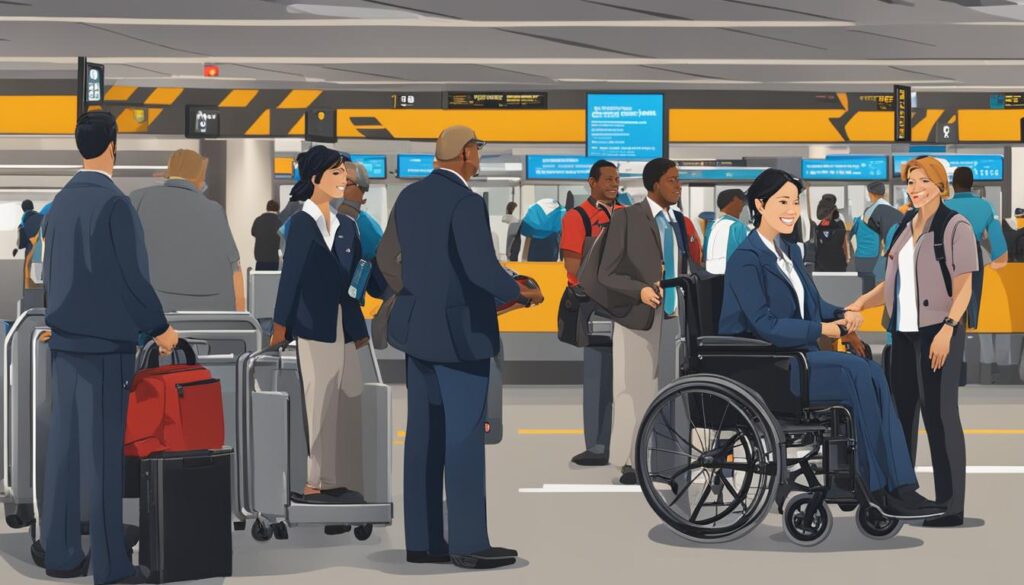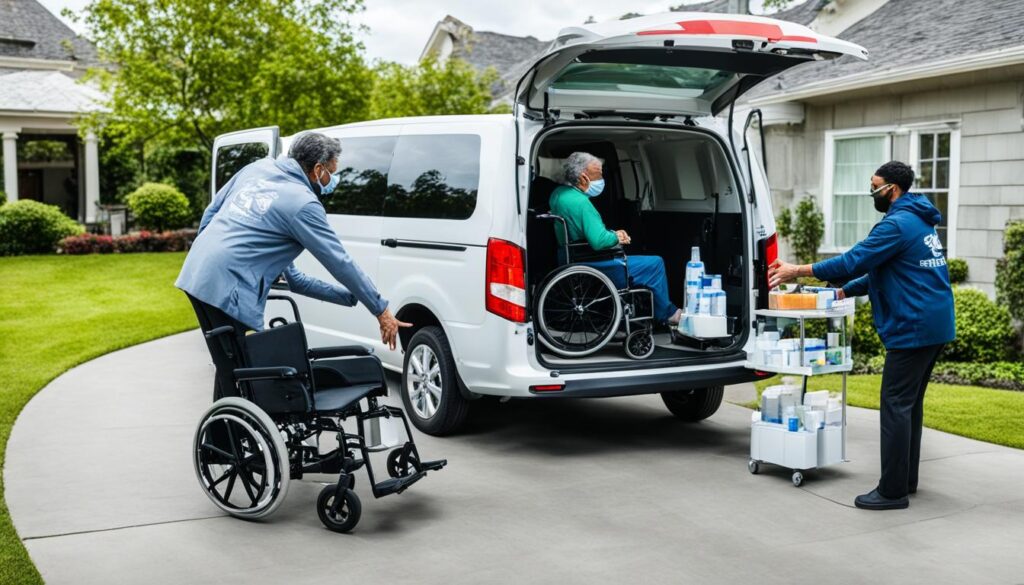If you’re a disabled traveler, you know that planning for a trip requires careful consideration of your specific needs. Accessible travel is essential to ensure that you can enjoy your destination safely and comfortably. In this article, we will provide essential tips for disabled travelers to have a secure and inclusive trip. We will discuss topics such as researching disability-friendly destinations, selecting accessible accommodations, and packing smart. Additionally, we will provide advice on navigating airports and transportation, ensuring medical care and medication accessibility, and staying safe and vigilant during your trip.
Our goal is to empower disabled travelers with the information and resources they need to embark on a memorable journey confidently. Whether it’s your first trip or your tenth, these travel safety tips and guidance for accessible and inclusive travel will help make your trip a success.
Understanding Your Needs and Planning Ahead
Traveling as a disabled person can be challenging, but proper planning and understanding your needs can make a big difference. Here are some disabled travel tips and travel resources for disabled individuals to consider before your trip:
Assessing Your Needs
Understanding your needs is crucial to ensure a safe and comfortable travel experience. Start by assessing your disability and how it affects your travel preferences and requirements. Consider your mobility restrictions, sensory needs, communication requirements, and any medical needs. This will help you plan your journey and identify the equipment and services you require.
Researching Accessible Destinations
Research destinations that prioritize accessibility and inclusion. Look for information online about the accessibility of tourist attractions, transportation services, restaurants, and accommodations. Check with travel agencies or disability organizations for recommendations. Consider factors such as the terrain, climate, and distance from medical facilities when choosing a destination that meets your needs.
| Travel Resources for Disabled | Description |
|---|---|
| Wheelchairtravel.org | A comprehensive travel guide with destination reviews, accessible travel tips, and travel planning resources for wheelchair users. |
| Disabledtravelers.com | A travel website that provides useful resources for disabled travelers, from accessible accommodation and transportation to travel insurance and emergency assistance services. |
| AccessibleGO.com | A platform that helps disabled travelers research, plan, and book an accessible trip. It includes extensive travel guides, reviews, and resources for booking transportation and lodging. |
Booking Accessible Accommodation
When booking accommodation, look for hotels and resorts that provide wheelchair accessibility, accessible bathrooms, and rooms with assistive devices such as bed rails and shower chairs. Some hotels may also provide medical equipment rentals such as wheelchairs and mobility scooters. Check if there are hotels with reliable elevators, accessible restaurant options, and proximity to medical facilities.
Arranging Transportation and Assistance Services
Transportation may be a significant barrier for disabled travelers. Plan ahead for your transportation needs, whether it’s booking an accessible taxi, arranging airport assistance, or finding a rental vehicle that accommodates your mobility device. Check with your airline for wheelchair assistance and boarding information. Some public transportation also provides accessibility features, such as low-floor buses or audio announcements. Research and book travel assistance services to ensure a smooth journey.
Packing Travel Essentials
When packing for your trip, don’t forget to bring all necessary medical equipment, mobility aids, and documents such as prescriptions, medical records, and insurance information. Pack extra medication and supplies in case of unexpected delays or emergencies. Consider bringing assistive devices such as hearing aids, braille displays, or portable ramps if needed.
Researching Disability-Friendly Destinations
When planning a trip as a disabled traveler, researching and finding disability-friendly destinations is essential to ensure a comfortable and enjoyable experience. Keep in mind that not all destinations provide the same level of accessibility, so thorough research is vital.
Start by checking out online resources such as Wheelchair Travel and Accessible Journeys for disability-specific travel advice. You can also search for forums and social media groups where fellow disabled travelers share their experiences and recommendations.
Another way to find accessible destinations is to consult with travel agencies that specialize in trips for disabled travelers. These agencies have in-depth knowledge of various destinations and can provide valuable insights and recommendations.
Before booking your trip, it’s essential to confirm that the destination meets your particular accessibility needs. Check if the destination has wheelchair-friendly pathways, accessible public transportation, and disability-friendly accommodations. Tables such as the one below can help you compare travel options and decide on the best destination that suits your accessibility requirements.
| Destination | Accessibility Score | Wheelchair Accessible Attractions | Disability-Friendly Accommodations |
|---|---|---|---|
| Orlando, Florida | 4.5 | 20 | 800+ |
| Sydney, Australia | 4.2 | 15 | 500+ |
| Amsterdam, Netherlands | 3.9 | 10 | 300+ |
| Tokyo, Japan | 3.8 | 5 | 200+ |
With the right research and preparation, you can find the perfect disability-friendly destination and embark on a memorable and fulfilling trip.
Selecting Accessible Accommodation
When planning a trip, finding the right accommodation is crucial to ensure a comfortable and safe stay. For disabled travelers, this step requires some additional consideration to guarantee that the hotel is wheelchair accessible and meets their specific needs. Here are some tips for selecting disability-friendly accommodations:
Research Before Booking
Prior to booking, research the hotel’s accessibility features thoroughly. Look for information on wheelchair accessibility, bathroom amenities, and any disability-related services they provide. Many hotel websites offer detailed information on their accessibility features, but it’s also a good idea to call the hotel directly to confirm the details and ask any questions you may have.
| Accessibility Features to Consider | Description |
|---|---|
| Accessible Rooms | Ensure that rooms designated as “accessible” have enough space for a wheelchair, roll-in shower or walk-in tub, and other features that accommodate mobility impairment. |
| Accessible Bathroom | Check if the bathroom has grab bars, an accessible sink, elevated toilet, and other features for disabled travelers’ comfort. |
| Wheelchair Accessibility | Check if there are ramps, elevators or wheelchair lifts, wider doors, and other accessibility features that make the hotel accessible. |
| Location Accessibility | Consider the hotel’s location and proximity to nearby wheelchair accessible transportation, restaurants, and attractions. |
| Disability-Related Services | Confirm if the hotel offers services such as wheelchairs on loan, sign language interpreters, and other resources for disabled travelers. |
By doing your research beforehand, you can avoid any unpleasant surprises during your stay.
Consider Location
The hotel’s location is also an essential factor to consider when selecting suitable accommodation. Researching the surrounding area and accessibility to wheelchair-friendly transportation, restaurants, and attractions is crucial, especially if you plan to explore the area. Consider finding accommodation located within reasonable distance to the attractions and activities you plan on visiting.
Communicate Your Needs
When making your reservation, communicate your specific needs to the hotel. Specify if you need a wheelchair accessible room, require a shower chair or other additional medical equipment, or prefer to stay on a lower floor. Being upfront about your requirements can help the hotel staff make necessary arrangements to ensure an enjoyable and comfortable stay.
Packing Smart
As a disabled traveler, packing smart is crucial to ensure you have everything you need while on your journey. Here are some disabled travel tips to help you pack effectively:
- Make a list: Before you start packing, create a list of all the items you need to bring with you. This will help you stay organized and prevent you from forgetting anything important.
- Pack light: When it comes to packing, less is more. Only bring what you really need to avoid lugging around heavy bags. Consider packing clothing pieces that can be mixed and matched to create different outfits.
- Bring necessary medical equipment: If you require medical equipment such as a wheelchair or oxygen tank, make sure to bring them with you. Contact your airline or transportation provider in advance to arrange any necessary accommodations for your equipment.
- Don’t forget medication: If you take medication, make sure to pack enough for the duration of your trip. Keep your medication in your carry-on bag to ensure it’s easily accessible.
- Consider mobility aids: Depending on your specific needs, it may be helpful to bring mobility aids such as canes or walkers.
- Bring comfortable shoes: As a disabled traveler, comfortable footwear is essential. Make sure to bring shoes that provide adequate support and comfort for long periods of walking or standing.
Remember, packing strategically is key to enjoying a safe and stress-free trip. By following these disabled travel tips, you’ll be well-prepared for your journey ahead.
Navigating Airports and Transportation
As a disabled traveler, navigating airports and transportation can be challenging, but with the right planning and resources, it can be made easier. Here are some tips to ensure a smooth journey:
Booking Accessible Flights
When booking your flight, choose an airline that offers wheelchair accessible travel and other disability-related services. Notify the airline of your needs at least 48 hours before departure, and arrive early to allow sufficient time for any necessary assistance.
Train or Bus Travel
When travelling by train or bus, research the accessibility of the stations and trains or buses in advance. Many stations offer wheelchair ramps and other accessible features, while some trains offer accessible seating and bathrooms. Contact the train or bus company in advance to request any assistance needed during your journey.
Transportation Assistance Services
If you require additional assistance, transportation assistance services are available. Many airports and train stations offer assistance such as wheelchair escorts, mobility aid rentals, and pre-boarding to make your journey easier. Contact the airport or train station in advance to request any necessary assistance.
“Traveling is more than the seeing of sights; it is a change that goes on, deep and permanent, in the ideas of living.” – Miriam Beard
Ensuring Medical Care and Medication Accessibility
When you’re a disabled traveler with specific medical needs, it’s important to prepare in advance to ensure a safe and enjoyable trip. Here are some tips to help you find the medical care and medication accessibility you need while traveling:
- Research healthcare providers in advance: Use resources like AccessAble and Patient.co.uk to research healthcare providers in your destination.
- Carry necessary documents: Always carry important medical documents, such as a list of medications, doctor’s notes, and a medical ID bracelet, with you at all times.
- Pack extra medication: Bring extra medication in case of unexpected situations, like delayed flights or lost luggage.
- Notify airline staff: If you have a medical condition, don’t forget to notify airline staff in advance and request any necessary accommodations, like special meals or additional oxygen.
It’s also important to make sure you know how to manage your medication while traveling. Here are some tips to help you:
- Organize your medications: Use a pill organizer to keep track of your medication and take up less space in your luggage.
- Check medication restrictions: If you’re traveling internationally, make sure that your medications are legal in the country you’re visiting.
- Pack medication in your carry-on: Keep your medication in your carry-on bag to ensure that it’s always with you.
- Know where to find medication: Research pharmacies and drugstores in your destination that may have the medication you need.
By taking these steps to prepare in advance, you can ensure that you have the medical care and medication accessibility you need while traveling.
Staying Safe and Vigilant During Your Trip
When traveling as a disabled person, ensuring your safety and security should be a top priority. By taking some practical steps, you can minimize risk and enjoy a safe journey. Here are some tips to help you stay safe and vigilant throughout your trip:
- Avoiding Scams: Travel scams can take many forms, and they often target tourists. Be wary of unsolicited offers, and do not give away your personal or financial information to strangers.
- Navigating Crowded Places: Crowded places such as airports, public transportation, and tourist attractions can be overwhelming for disabled travelers. If possible, try to avoid peak traveling hours, and plan ahead to find accessible routes.
- Staying Connected: Make sure you have a reliable way to stay in touch with your support network and emergency services. Keep important phone numbers and contacts stored on your phone or in a notebook, and consider using technology such as GPS tracking devices or emergency assistance apps.
Remember, staying safe and vigilant while traveling as a disabled person requires a combination of preparation, vigilance, and common sense. By taking the necessary precautions, you can focus on enjoying your trip without worrying about potential risks.
Communicating Your Needs to Others
Traveling with a disability can present unique challenges, but effective communication can help ensure that your trip is safe and enjoyable. When interacting with hotel staff, tour guides, and other travel professionals, it’s important to clearly communicate your specific needs.
Here are some tips for communicating your requirements:
- Be clear and specific about your needs, whether it’s requesting an accessible room or wheelchair assistance at the airport
- Don’t hesitate to ask questions or request additional help if needed
- Use assistive devices, such as communication cards or language translation apps, to overcome language barriers
Remember, communication is a two-way street. Listening to the advice and suggestions of travel professionals can also help ensure a safe and enjoyable trip. With clear and effective communication, you can overcome barriers and enjoy all that your destination has to offer.
Tip: Use visual aids
If you have difficulty communicating verbally, consider carrying visual aids such as picture cards or videos to help explain your needs. This can be especially helpful when traveling in countries where you may not be fluent in the language.
Exploring Accessible Activities and Attractions
Traveling as a disabled person should not prevent you from experiencing the various attractions that your destination has to offer. In fact, many tourist destinations now prioritize accessibility and inclusive experiences. Below are some accessible activities and attractions that you can include in your travel itinerary:
| Activity/Attraction | Description | Recommended Destination |
|---|---|---|
| Adaptive Sports | Participation in outdoor sports using adaptive equipment to enable those with disabilities to ski, kayak, or surf. | Whistler, British Columbia, Canada |
| Disability-Friendly Museums | Museums designed to accommodate disabled visitors, including access to exhibits, audio and visual aids, and tactile displays. | The British Museum, London, United Kingdom |
| Accessible Theme Parks | Theme parks with accessible rides and attractions for those with disabilities, including accessible parking, entrances, and restrooms. | Disneyland, Anaheim, California, USA |
| Disability-Friendly Tours | Tours designed specifically for disabled travelers with specially trained tour guides and accessible transportation. | Accessible Madrid Tour, Madrid, Spain |
If you’re unsure about which activities and attractions are accessible or suitable for disabled travelers, you can reach out to specialized travel agencies for more information. Moreover, tourist information centers also offer guidance on inclusive and accessible travel, making it easier to plan your itinerary.
By taking advantage of these disabled-friendly travel options, you can create unforgettable experiences during your journey, safely and comfortably. Don’t let your disability stop you from exploring the world around you!
Utilizing Assistive Technology and Apps
Traveling as a disabled person can present unique challenges, but with the help of technology and travel apps, you can significantly enhance your travel experience. From navigation to translation, there are several useful resources available that can help you navigate your trip with confidence.
If you use a wheelchair, there are apps like Wheelmap that can help you find wheelchair accessible places along your route. This app provides information on restaurants, shops, and other public places, giving you the peace of mind that you’ll be able to access the facilities you need. You can also use Google Maps to find wheelchair accessible transportation options and to get directions for the most accessible route to your destination.
For those who are hard of hearing or deaf, there are apps like Ava and Live Transcribe that can help you communicate with others in real-time. These apps use speech-to-text technology to transcribe speech into text, making it easier to follow conversations and communicate effectively with others.
If you have limited mobility, there are apps like AccessNow that can help you find accessible transportation and services in different cities around the world. Additionally, you can use the Be My Eyes app to connect with volunteers who can help you with tasks like reading labels or navigating unfamiliar places.
Assistive technology like screen readers and voice assistants can also be incredibly helpful when traveling as a disabled person. Tools like these can assist with tasks like booking flights, retrieving travel information, and navigating your way through airports.
By utilizing the various apps and technologies available, disabled travelers can overcome common travel barriers and ensure a safe and enjoyable journey.
Conclusion
As a disabled traveler, it’s essential to prioritize your safety and comfort while planning and embarking on a trip. Through understanding your specific needs, researching disability-friendly destinations, selecting suitable accommodations, and packing smart, you can ensure a smooth and secure journey.
Navigating airports and different modes of transportation, accessing necessary healthcare and medications, staying vigilant throughout your trip, and effective communication are also crucial aspects of travel safety for disabled travelers.
Remember to explore accessible activities and attractions and utilize assistive technology and travel apps to enhance your travel experience.
With the right preparation and planning, accessible travel can be inclusive, safe, and enjoyable. Embrace the adventure and embark on a memorable journey with confidence.




























